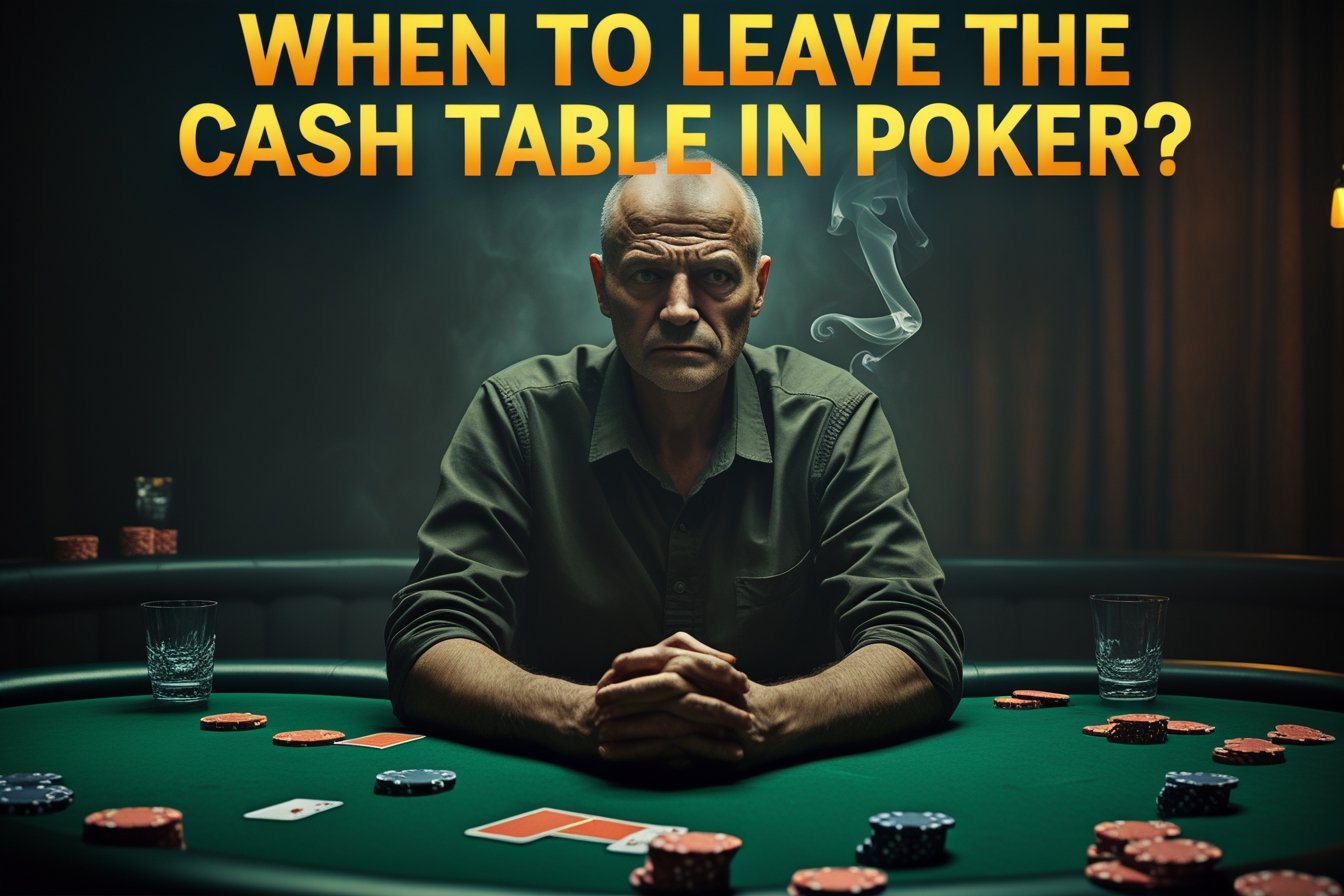When to Leave the Cash Table in Poker?

Master the art of leaving a poker cash table!
You've been playing poker for a while, stacking up chips or maybe watching them disappear. In a cash game, unlike a tournament, you can leave whenever you want. This freedom is great, but it also means you need to know when to leave the table. Knowing when to leave is just as important as knowing how to play your cards. It keeps your money safe, helps you stay focused, and leads to better results over time.
A Guide on When to Leave The Cash Table
1. You've Lost Too Much
This is the most important rule. Before you even sit down, decide how much you're okay with losing in one sitting. This is your stop-loss.
- Why it's key: When you're losing a lot, it's easy to get upset or angry (this is called "tilt"). When you're on tilt, you make bad choices, play recklessly, and usually lose even more money faster.
- What to do: The moment you hit your stop-loss, get up. Don't say, "just one more hand" or "I can win it back." Just leave. There will always be another game.
2. You've Won Enough
It's also good to have a win goal – an amount you'd be happy to walk away with. You don't have to leave when you hit it, but it should make you think.
- Why it's key: When you're up a lot, you might get lazy or too careful, missing chances to win more. Also, it locks in your profit! It's terrible to be winning big, only to lose it all later in the same game.
- What to do: When you hit your win goal, look at the game. Is it still easy to win money? Are you still playing your best? If not, or if you're happy with your winnings, cash out.
3. The Game Isn't Good Anymore
This is a smart reason to leave. A good game means there are players making mistakes you can take advantage of – often those who play too many hands or are easy to read.
a) Signs the game has gone bad:
- The weaker players left: If the "fish" (the less skilled players who were losing money) have left, and now it's just tough, regular players, it's harder to win.
- Everyone is playing tight: If no one is playing many hands and everyone is being super careful, it's hard to win big pots or bluff.
- You're surrounded by pros: If the table suddenly seems full of really good, aggressive players, it's time to find an easier game.
b) What to do:
Don't stay just because you started there. Your main goal is to make money, and that means finding the best tables. If the game isn't good, leave and find a better one.
4. You're Not Playing Your Best
Poker needs your full attention. If you're tired, angry, or upset, you won't make good choices.
a) Signs you're off your game:
- Tilt: You're making wild calls, trying to bluff too much, or playing hands you shouldn't because you're mad about a past hand.
- Tired: You're spacing out, missing clues from other players, making simple math mistakes, or can't focus.
- Bored/Distracted: You're checking your phone too often, or just not paying attention to the game.
b) What to do:
If you feel yourself slipping, it's a clear sign to take a break. A tired or upset player usually loses money. Go for a walk, grab some food, or just end your session.
5. You're Not Feeling Well
Your body and mind work together. If you're not physically well, your poker game will suffer.
a) Things to watch for:
- Hungry/Thirsty: Low sugar or dehydration can affect how you think.
- Sleepless: Not enough sleep makes it hard to focus.
- Sick: If you're unwell, your judgment won't be clear.
- Drinking/Drugs: Alcohol or other substances make you play poorly.
b) What to do:
Take care of yourself. If you can't, leave the table.
6. You Have Other Plans
Poker should fit into your life, not take it over. Don't let a "good game" make you miss important plans or lose sleep.
- Examples: Work, family time, appointments, or just needing to get enough rest for tomorrow.
- What to do: Stick to your schedule. Poker will always be there later.
7. You Feel Unsafe or Uncomfortable
This is more for live poker. Your safety and comfort are always most important.
a) Situations:
- Aggressive players: If someone at the table is making you feel genuinely uneasy or threatening.
- Cheating: If you think there's any funny business going on.
- Unsafe place: If the casino or card room itself doesn't feel safe.
b) What to do:
Your well-being comes first. Quietly cash out and leave.
Leaving Isn't Quitting, It's Smart
Some players feel bad about leaving, especially if they're losing. But leaving a game when it's no longer good, or when you're not at your best, shows discipline, self-awareness, and smart long-term thinking.
It's not giving up; it's about being a winner in the long run. By following these tips, you'll not only protect your money but also build the strong mindset you need for lasting success at the poker table. When the time is right, pack up your chips with confidence.
April 30, 2024
Dec. 20, 2024
Sept. 9, 2024
Leave a reply